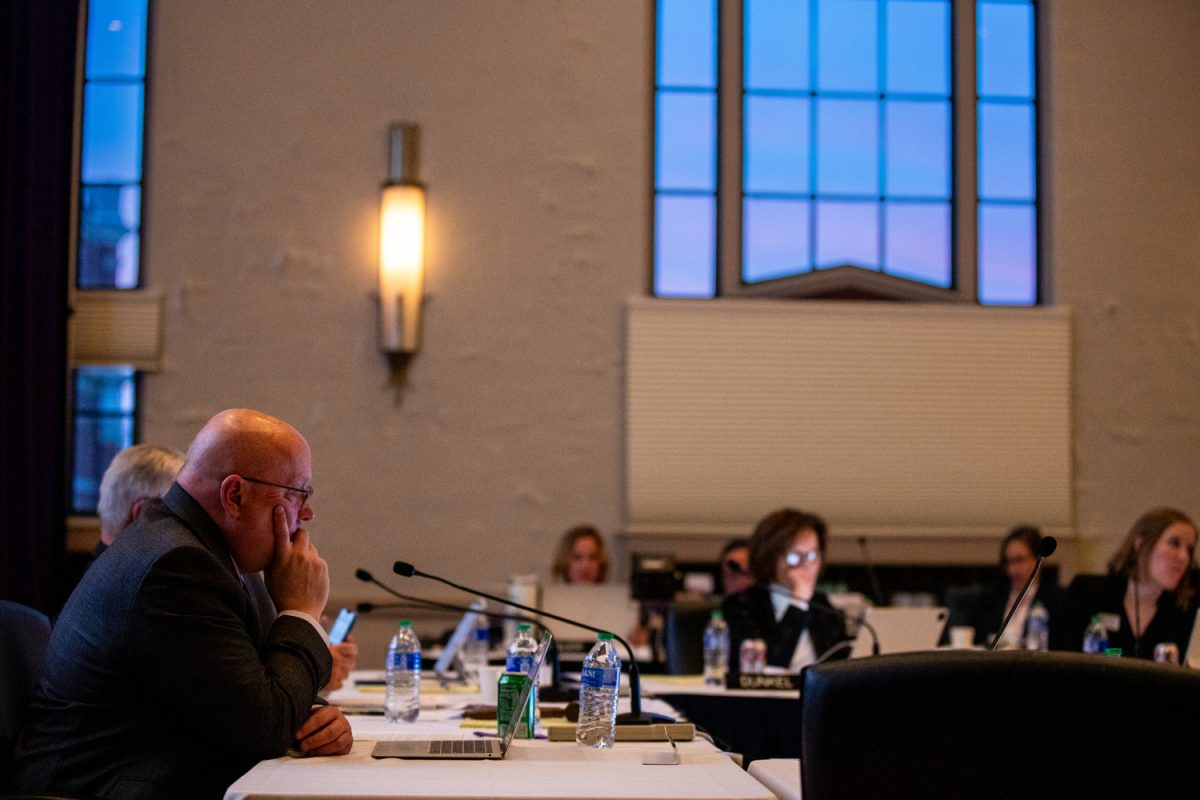The University of Iowa will have to revamp its diversity, equity, and inclusion departments, offices, policies, and efforts across campus after recommendations from the Iowa Board of Regents were approved earlier this month following a months-long DEI study at regent institutions.
The approval, which came on Nov. 16 at the regents’ meeting after over an hour of deliberation, will result in the restructuring of multiple DEI-related departments and groups for compliance and accreditation at all public universities in Iowa.
Regents President Mike Richards first created the study group in March to investigate the need for DEI programs and initiatives at the three regent universities. The study was completed earlier this semester, with an opportunity in August for the community to provide feedback. The final report was included with the regents’ agenda for its Nov. 16-17 meeting.
The group and study were created in response to proposed bills from the Iowa Legislature that would defund, investigate, and restrict DEI programs at the three state
universities. Consequently, Richards paused the implementation of new DEI programs at the three regent schools following the investigation, while existing programs could continue to operate.
Now, the UI will restructure and reevaluate DEI-related issues across campus based on recommendations that were presented by the study group — made up of regents Jim Lindenmayer, Greta Rouse, and David Barker, along with regents staff.
Regent study group presents changes to faculty policies, DEI offices
The study group presented a total of 10 recommendations to the regents involving the restructuring of DEI at the state universities, including the restructuring of the central DEI offices to eliminate anything DEI-related that is not required for compliance or accreditation.
According to the report, a concern was that services provided by the decentralized DEI offices were not being offered to all students.
One specific area mentioned in this recommendation was the UI Office of Multicultural & International Student Support & Engagement since its programming is “centered on minority or underrepresented populations,” meaning that interested students could reasonably interpret the services provided as “being limited to minority students.”
“The study group agrees that staff in decentralized units and multicultural centers offer some important services that support student success, although better efforts could be made to assure that students understand that all are welcome,” the report read.
The list also touched on DEI offices at regent universities, recommending the review of all “college, department, or unit-level DEI positions” to examine which, if any, DEI-related job responsibilities were necessary for compliance, accreditation, or student and employee support services.
According to the report, if the review finds that any DEI-related jobs or positions are not important or essential, it is recommended that those job responsibilities are eliminated or adjusted. The review would also examine positions or working titles to ensure the titles accurately reflected the jobs’ responsibilities.
The presentation of the findings was met with some disagreements and resistance, specifically on recommendations one, two, eight, and nine of the study group’s report. On recommendations one and two, which focused on the restructuring of DEI offices and the reviewing of all positions, most of the regents voted yes, except for Nancy Dunkel and Abby Crow.
Recommendation eight was to find ways to advance the diversity of “intellectual and philosophical perspective” for the pool of faculty and staff applicants.
“The Study Group notes that universities across the country have or are considering the establishment of centers, institutes, or similar initiatives dedicated to freedom of expression and civic education,” the report read. “The Study Group recommends that the regent universities evaluate whether such an initiative could be efficiently and effectively implemented within the regent system.”
The last recommendation separated for individual discussion and vote was recommendation nine. This recommendation was to develop a proposal that would establish a widespread initiative that includes an opportunity for education and research on free speech and civic education.
For this recommendation, the study group focused on statements from the universities and each respective DEI office at the universities. They noted that some of these groups had published statements that the group believed could be perceived as being representative of the whole school, or in other cases, differed from the regents.
Following the presentation of the findings, regent Dunkel said she disagreed with the recommendations.
“We need to use our good judgment to steward the institutional systems forward,” Dunkel said at the meeting. “We have a fiduciary duty of loyalty to our region schools’ mission, and we’re supposed to stay independent and faithfully serve our institutions over our other interests.”
This prompted regents Lindenmayer and Barker to further discuss the study group’s findings.
Lindenmayer said the group’s report was sufficiently vague to give regents the latitude to continue to serve their students and also address the concerns that come from state legislators.
“I understand the concerns of the four points, and I think they’re relevant concerns to be addressed, but I’m not sure even the study committee knows enough about the detail of how these will be implemented to make a recommendation here,” Lindenmayer said at the meeting.
Regent Crow asked for recommendations eight and nine to be pulled from the initial vote with Dunkel asking for recommendations one and two to be pulled as well.
The regents then proceeded to vote on recommendations three through seven and recommendation ten. All regents voted yes except for Lindenmayer when Dunkel motioned to reconsider the vote after a brief recess. She proceeded to vote no, while Lindenmayer changed his vote to yes.
On recommendation eight, all regents voted yes, except Dunkel, Lindenmayer, and Crow. On recommendation nine, the dissenting votes came from Dunkel and Barker after the passing of amended language.
Regents Crow and Dunkel disagreed with the adoption of the four recommendations.
“I have full faith in our institutions’ ability to evaluate what services to offer for our students,” Crow said at the meeting. “I do value the importance of having internalized structures that support our students in a variety of ways.”
Crow said she could not support the recommendations as they go against students’ comments and what many have come to her to talk about.
“I want to support the students that my constituency and I represent,” Crow said at the meeting.
UI stakeholders respond to required changes
Multiple UI offices, groups, and departments have issued statements following the regents’ decision earlier this month, including The Division of Diversity, Equity, and Inclusion.
According to a Nov. 16 statement written by UI Executive Officer and Associate Vice President of the Division of Diversity, Equity, and Inclusion Liz Tovar and UI Vice President for External Relations and Senior Advisor to the President Peter Matthes, the recommendations are an opportunity to use the current DEI initiatives in a way that aligns and ensures compliance and accreditation.
“We know there will be many questions from students, faculty, and staff regarding how this will impact the university’s ability to provide a welcoming and inclusive campus,” the statement reads. “We want to provide the campus with some information about the recommendations to address some of the questions.”
UI Faculty Senate President Ed Gillan wrote in an email to The Daily Iowan that while faculty will be impacted by the study and the soon-to-be-implemented changes, he is hopeful that the updates will have a positive effect.
“I see value in UI’s proposed review of our current campus DEI efforts and its structure and function,” he wrote. “I think we will find that UI already conducts much of its DEI work within the framework of federal rules, academic accreditation standards, as well as NCAA and federal research grant agency requirements.”
Gillan added he is optimistic that the UI task force will find ways to improve the university’s DEI effectiveness as it continues to “serve the needs of our faculty, students, and staff.
“It is of critical importance that our academic programs and institution prepare our students for successful post-graduate careers in an increasingly global and diverse workplace,” he wrote.
Additionally, some programs have released statements in light of the regents’ approval, including the UI Honors Program. In an email sent to students on Nov. 15, the letter states that the recommendations will represent a change to “the structure and delivery of some services on campus,” but not the university’s commitment to diversity and inclusion.
“This is also true of the commitment of the Honors Program to foster a welcoming and inclusive environment that is supportive of all identities, both visible and invisible,” it states. “To help sustain our culture of accepting and uplifting students from all backgrounds and experiences, we are encouraging students to create a registered student organization focused on diversity and inclusion to support belonging and community in the Honors Program.”
Other areas of impact
The news of the new requirements comes as colleges and universities across the United States change their admissions policies in light of the U.S. Supreme Court’s Affirmative Action ruling earlier this year. Chris Brewer, UI public relations manager, wrote in an email to the DI that the study will not have an impact on the UI’s undergraduate admissions process.
“Students are admitted to the state’s three public universities based on their Regents Admission Index or RAI score, which is calculated on their academic and extracurricular achievements,” he wrote.
Next steps for UI DEI
As the UI moves to implement the recommendations, a task force will be created to “review and evaluate the Division of Diversity, Equity, and Inclusion and all campus-related diversity and inclusion efforts,” according to the UI diversity website.
The task force will provide recommendations to UI President Barbara Wilson and Provost Kevin Kregel by March 2024. Those recommendations will then be shared with the regents at its April 2024 meeting.
Alejandro Rojas and Shreya Reddy contributed to this report.










